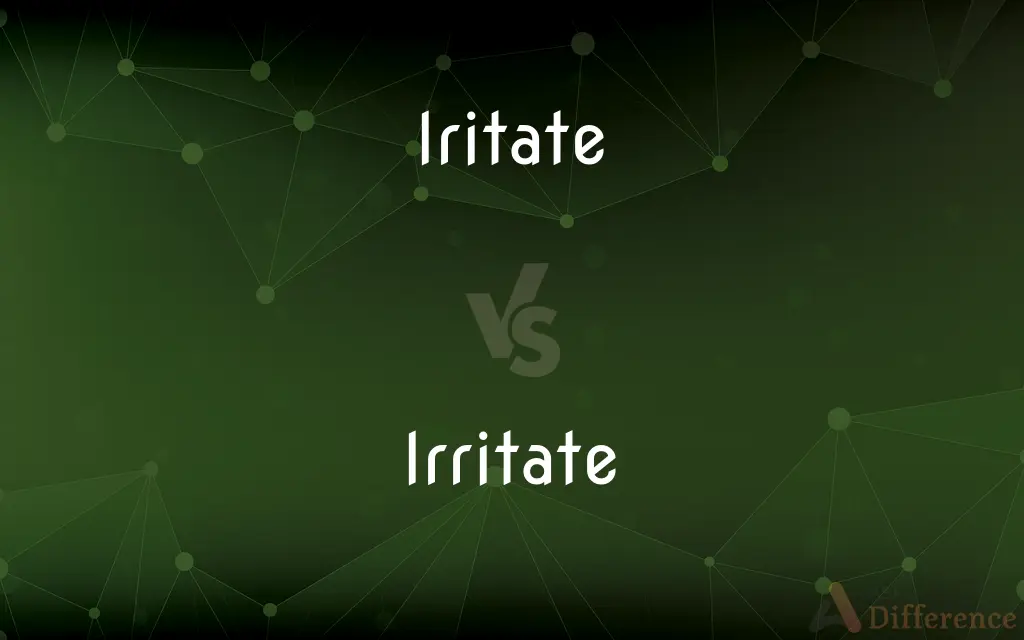Iritate vs. Irritate — Which is Correct Spelling?
Edited by Tayyaba Rehman — By Fiza Rafique — Updated on March 30, 2024
"Iritate" is an incorrect spelling. The correct spelling is "irritate," which means to annoy or provoke discomfort.

Table of Contents
Which is correct: Iritate or Irritate
How to spell Irritate?

Iritate
Incorrect Spelling

Irritate
Correct Spelling
ADVERTISEMENT
Key Differences
Compare with other words like "irradiate" that also use "irr-."
Say "ir-ri-tate" to emphasize both the "r" sounds.
Remember "irr-" as in "irregular" or "irrelevant."
Visualize the word with two "r" characters standing close, irritating each other.
Think of irritation having a double "rr" because it's doubly annoying.
ADVERTISEMENT
How Do You Spell Irritate Correctly?
Incorrect: Loud noises can iritate her easily because of her migraine.
Correct: Loud noises can irritate her easily because of her migraine.
Incorrect: He tried not to let the mistake iritate him, but it was difficult.
Correct: He tried not to let the mistake irritate him, but it was difficult.
Incorrect: Pollution can iritate your eyes and lead to serious discomfort.
Correct: Pollution can irritate your eyes and lead to serious discomfort.
Incorrect: The tag on the shirt tends to iritate my neck.
Correct: The tag on the shirt tends to irritate my neck.
Incorrect: Some chemicals can iritate the skin, causing redness or swelling.
Correct: Some chemicals can irritate the skin, causing redness or swelling.
Irritate Definitions
Irritate can mean to induce inflammation or discomfort in a body part.
The new detergent seemed to irritate my skin.
Irritate is to vex or disturb in action or function by a stimulus.
Bright lights can irritate the pupils of the eyes.
Irritate denotes causing a sensitive or negative reaction.
Some perfumes can irritate the eyes.
Irritate can signify provoking impatience, anger, or displeasure.
Continual interruptions irritate the speaker.
To cause (someone) to feel impatient or angry; annoy
A loud, bossy voice that irritates listeners.
To make sore or inflamed
The smoke irritated my eyes.
(Physiology) To cause a physiological response to a stimulus in (a cell, body tissue, or organism).
To be a cause of impatience or anger.
(transitive) To provoke impatience, anger, or displeasure in.
(intransitive) To cause or induce displeasure or irritation.
(transitive) To induce pain in (all or part of a body or organism).
To render null and void.
To increase the action or violence of; to heighten excitement in; to intensify; to stimulate.
Cold maketh the spirits vigorous and irritateth them.
To excite anger or displeasure in; to provoke; to tease; to exasperate; to annoy; to vex; as, the insolence of a tyrant irritates his subjects.
Dismiss the man, nor irritate the god:Prevent the rage of him who reigns above.
To make morbidly excitable, or oversensitive; to fret; as, the skin is irritated by friction; to irritate a wound by a coarse bandage.
Excited; heightened.
Cause annoyance in; disturb, especially by minor irritations;
Mosquitoes buzzing in my ear really bothers me
It irritates me that she never closes the door after she leaves
Excite to an abnormal condition, of chafe or inflame;
Aspirin irritates my stomach
Excite to some characteristic action or condition, such as motion, contraction, or nervous impulse, by the application of a stimulus;
Irritate the glands of a leaf
Irritate means to cause annoyance or displeasure.
Loud noises irritate me.
Irritate Meaning in a Sentence
It's important to use hypoallergenic products to not irritate sensitive skin.
The bright lights in the office tend to irritate my eyes after a few hours.
Constant interruptions can irritate even the most patient person.
It's not just physical; harsh words can also irritate and upset someone emotionally.
Wearing contacts for too long can irritate your eyes.
Dry air in winter can irritate the throat and nasal passages.
Repetitive sounds, like a dripping faucet, can irritate people and disturb their sleep.
She found that artificial sweeteners irritate her stomach.
Certain laundry detergents contain chemicals that may irritate those with allergies.
Pollen and dust can irritate asthma and allergy symptoms.
Loud snoring can not only irritate your partner but also disrupt your sleep quality.
Foods that are too spicy can irritate the stomach, leading to discomfort.
I try to avoid certain fabrics that irritate my skin.
Being stuck in traffic can irritate anyone, especially when you're running late.
The noise from construction outside can irritate anyone trying to work from home.
Overusing your voice without proper hydration can irritate your vocal cords.
Perfumes and colognes with strong scents can irritate some people's senses.
Harsh facial cleansers can irritate acne rather than help it.
Sunburn can irritate the skin, causing pain and peeling.
Pets can sometimes irritate their owners by shedding hair on furniture and clothing.
It's irritating when a movie ends on a cliffhanger without any resolution.
Common Curiosities
What is the verb form of irritate?
"Irritate" is already in its verb form.
What is the root word of irritate?
The root is Latin "irritare."
What is the pronunciation of irritate?
/ˈɪr.ɪ.teɪt/
Which vowel is used before irritate?
Depending on context, "a" or "an" can be used before "irritate."
Why is it called irritate?
It derives from Latin "irritare," meaning "to provoke" or "to annoy."
What is the singular form of irritate?
"Irritate" is already singular.
Which preposition is used with irritate?
"by" as in "irritated by the noise."
Is irritate a noun or adjective?
Verb.
Which conjunction is used with irritate?
Any conjunction can be used, depending on the context.
Is irritate a negative or positive word?
Generally negative.
Is the irritate term a metaphor?
No, but it can be used metaphorically.
What is the plural form of irritate?
"Irritates" when referring to third person singular, but verbs don't typically have plurals like nouns do.
Is irritate a countable noun?
"Irritate" is a verb, not a noun.
How many syllables are in irritate?
Three.
What is the opposite of irritate?
Soothe or calm.
What is the second form of irritate?
Irritated.
What is the third form of irritate?
Irritated.
Is irritate an abstract noun?
No.
Is irritate a collective noun?
No.
Is the word irritate imperative?
It can be, e.g., "Do not irritate the dog!"
How do we divide irritate into syllables?
ir-ri-tate.
What is a stressed syllable in irritate?
"ri."
What is the first form of irritate?
Irritate.
How is irritate used in a sentence?
"Loud and continuous noise tends to irritate me."
Which article is used with irritate?
"The" or "an" can be used, depending on context.
Is irritate an adverb?
No.
Which determiner is used with irritate?
Determiners like "this" or "that" can be used, depending on context.
Is irritate a vowel or consonant?
"Irritate" is a word containing both vowels and consonants.
What part of speech is irritate?
Verb.
What is another term for irritate?
Annoy.
Share Your Discovery

Previous Comparison
Contigent vs. Contingent
Next Comparison
Mongose vs. MongooseAuthor Spotlight
Written by
Fiza RafiqueFiza Rafique is a skilled content writer at AskDifference.com, where she meticulously refines and enhances written pieces. Drawing from her vast editorial expertise, Fiza ensures clarity, accuracy, and precision in every article. Passionate about language, she continually seeks to elevate the quality of content for readers worldwide.
Edited by
Tayyaba RehmanTayyaba Rehman is a distinguished writer, currently serving as a primary contributor to askdifference.com. As a researcher in semantics and etymology, Tayyaba's passion for the complexity of languages and their distinctions has found a perfect home on the platform. Tayyaba delves into the intricacies of language, distinguishing between commonly confused words and phrases, thereby providing clarity for readers worldwide.


































